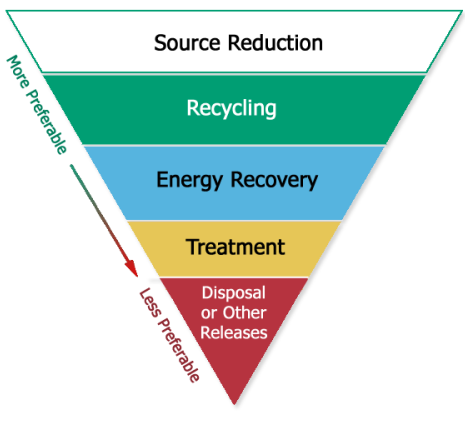Production Related Waste Management for Selected Chemical
lchemid=0000095636
Waste Management Comparison - 2019
Pollution Prevention Activities for Selected Chemical
| Reporting Year | Section 8.10: Newly Implemented Source Reduction Activity | Section 8.10: Methods to Identify Activity | Section 8.11: Optional Pollution Prevention Information* |
|---|---|---|---|
| 2014 |
Barriers: B3-Barriers to P2 B3 - Concern that product quality may decline as a result of source reduction.
|
Barriers to P2: B3 - Concern that product quality may decline as a result of source reduction. - Applying lesser quality paints and wielding may sacrifice equipment integrity. |
|
| 2011 | Other Environmental Practices - The Kiewit Offshore Services, Ltd. (KOS) facility began its construction in July 2001 in Ingleside, Texas. Based on industry knowledge, waste minimization, disposal, and recycling practices were identified and implemented from the inception of the facility. It is the goal of KOS to reduce the generation of all Class I and hazardous wastes or, at a minimum for those wastes that must be generated, have them recycled where feasible. These chemicals, for the most part, become part of the manufactured article, but are not considered exempt for reporting purposes. When available, KOS attempts to educate the client in non-waste generating manufacturing procedures and constituents as alternatives to the initial product specification. KOS will continue to pursue the identification of products and chemicals used in its primary activities to allow the client and KOS to reduce its impact on the environment. The volume release or use of TRI reportable chemicals and/or the generation of hazardous wastes at the KOS facility will be dependent on the industry demand and necessary production, which fluctuates annually. Therefore, it is difficult to measure or project specific reductions. As described earlier, the generation of all Class I and hazardous wastes or, at a minimum for those wastes that must be generated, have them recycled where feasible. | ||
| 2010 | Other Environmental Practices - The Kiewit Offshore Services, Ltd. (KOS) facility began its construction in July 2001 in Ingleside, Texas. Based on industry knowledge, waste minimization, disposal, and recycling practices were identified and implemented from the inception of the facility. It is the goal of KOS to reduce the generation of all Class I and hazardous wastes or, at a minimum for those wastes that must be generated, have them recycled where feasible. These chemicals, for the most part, become part of the manufactured article, but are not considered exempt for reporting purposes. When available, KOS attempts to educate the client in non-waste generating manufacturing procedures and constituents as alternatives to the initial product specification. KOS will continue to pursue the identification of products and chemicals used in its primary activities to allow the client and KOS to reduce its impact on the environment. The volume release or use of TRI reportable chemicals and/or the generation of hazardous wastes at the KOS facility will be dependent on the industry demand and necessary production, which fluctuates annually. Therefore, it is difficult to measure or project specific reductions. As described earlier, the generation of all Class I and hazardous wastes or, at a minimum for those wastes that must be generated, have them recycled where feasible. |
TRI Pollution Prevention Glossary
The Waste Management Hierarchy |
The waste management hierarchy established by the Pollution Prevention Act (PPA) guides waste generators toward the best options for managing wastes.
The preferred option is to prevent pollution at its source, but for waste that is generated, the preferred management methods are recycling, followed
by burning for energy recovery, treatment and, as a last resort, disposing of the waste.
|
- A breakdown of production-related waste managed. This includes all amounts of the chemical released directly to the environment or otherwise managed as waste, other than waste generated by one-time events not associated with normal production processes (e.g., fires or remedial actions).
- A production ratio or activity index to provide context for reported toxic chemical quantities. For example, if a chemical is used in the manufacture of refrigerators, the production index would track the number of refrigerators produced and could be used to help gauge how much of the chemical is being released per unit of production.
- Any newly implemented source reduction activities, reported using "W-codes" (e.g., "W41: Increased purity of raw materials")